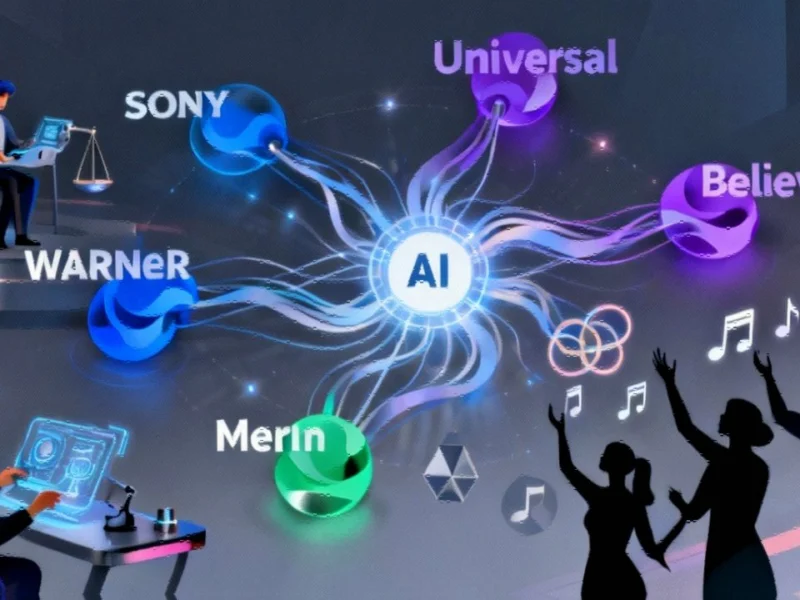Spotify’s Strategic Shift Toward Responsible AI Implementation
In a landmark move that could reshape the relationship between artificial intelligence and creative industries, Spotify has announced a comprehensive partnership with the world’s leading music companies to develop an ethical framework for AI integration. This collaboration with Sony Music Group, Universal Music Group, Warner Music Group, Merlin, and Believe represents a significant departure from the tech industry’s typical approach to AI development, placing artist rights and compensation at the forefront of innovation.
The streaming platform’s initiative comes at a critical juncture in the ongoing debate about AI’s role in creative fields. As industry developments continue to evolve rapidly, Spotify is positioning itself as a responsible leader rather than a disruptive force, acknowledging that the music industry must guide technological advancement rather than react to it.
Four Pillars of Ethical AI Implementation
Spotify’s framework is built around four core principles that distinguish it from other tech companies venturing into AI. The partnership model emphasizes collaboration with record labels, distributors, and music publishers while ensuring artist choice in participation, fair compensation structures, and enhanced artist-fan connections. This comprehensive approach addresses multiple pain points that have emerged as AI technology has advanced.
Alex Norström, Spotify’s Co-President and Chief Business Officer, emphasized the company’s philosophy: “Technology should always serve artists, not the other way around. Our focus at Spotify is making sure innovation supports artists by protecting their rights, respecting their creative choices, and creating new ways for fans to discover and enjoy the music they love.”
Copyright Protection in the Age of AI
At the heart of Spotify’s announcement is a firm stance on copyright protection, directly challenging the perspective held by some in the tech industry that copyright should be abolished for AI training purposes. Spotify’s position aligns with ongoing legal battles surrounding intellectual property in the digital age, including recent lawsuits filed by major labels against AI startups Udio and Suno.
The company’s statement explicitly acknowledges that “musicians’ rights matter” and that “copyright is essential,” signaling a commitment to ensuring that AI development doesn’t come at the expense of creator rights. This stance represents a significant shift in how major tech platforms are approaching the tension between innovation and intellectual property protection.
Learning from Past Controversies
Spotify’s initiative appears to be a direct response to recent controversies in the AI music space, particularly the 2023 viral song ‘Heart on My Sleeve’ that used AI-generated vocals to mimic Drake and The Weeknd. Universal Music Group, which represents both artists, had labeled the track “infringing content created with generative AI,” highlighting the urgent need for clear guidelines.
The new framework aims to prevent similar incidents through proactive measures rather than reactive responses. This approach to technology governance represents a maturing of the relationship between creative industries and technology platforms, moving from conflict to collaboration.
Inclusive Approach to Independent Artists
Beyond the major labels, Spotify’s partnerships with Merlin and Believe ensure that independent artists and smaller labels will benefit from the same protections and opportunities. This inclusive approach acknowledges that strategic partnerships must encompass the entire music ecosystem, not just its largest players.
Merlin’s statement highlighted that Spotify’s principles align with its mission to protect and respect independent creators, while Believe praised the commitment to “responsible and value-creative AI.” This broad industry support suggests that Spotify’s framework could become a model for other platforms grappling with similar challenges.
Technical Implementation and Future Directions
Spotify is establishing a “state-of-the-art generative AI research lab” to explore new tools that benefit artists while ensuring proper compensation and transparent credit systems. This technical infrastructure will build upon Spotify’s existing AI implementations, such as its AI DJ and Daylist playlists, but with a renewed focus on ethical considerations.
The company’s approach to AI development emphasizes transparency and partnership, contrasting with the opaque training methods employed by some AI startups. Industry leaders have praised this methodology, with Warner Music Group CEO Robert Kyncl describing Spotify’s framework as “thoughtful” and establishing appropriate guardrails for the technology.
Broader Implications for Creative Industries
Spotify’s announcement represents more than just a music industry development—it signals a potential shift in how technology companies approach creative content across multiple domains. As related innovations continue to emerge in adjacent fields, the principles established in this framework could influence how AI is integrated into film, literature, and other creative sectors.
The emphasis on “direct licensing in advance,” as highlighted by Sony Music Group Chair Rob Stringer, establishes a precedent that could reshape licensing practices across entertainment industries. This proactive approach to rights management contrasts with the retrospective compensation models that have often characterized digital platform relationships with content creators.
The Path Forward for AI and Creativity
Spotify’s comprehensive framework demonstrates that technological innovation and artist protection need not be mutually exclusive. By collaborating closely with rights holders and prioritizing consent and compensation, the company is attempting to chart a middle course between technological stagnation and disruptive exploitation.
As the music industry continues to navigate the challenges and opportunities presented by AI, Spotify’s partnership model offers a template for responsible innovation. The success of this initiative will likely influence how other platforms approach AI integration, potentially establishing new industry standards for ethical technology development in creative fields.
The company’s message is unequivocal: artists must remain at the center of creative expression, even as AI transforms the tools and platforms through which that expression reaches audiences. How this balance is maintained will shape not only the future of music but the broader relationship between human creativity and artificial intelligence across all creative domains.
This article aggregates information from publicly available sources. All trademarks and copyrights belong to their respective owners.



